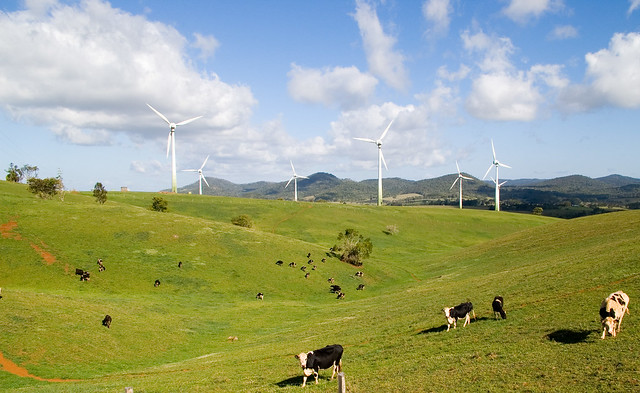Oil and gas companies and their government and lobbyist advocates love to wax lyrical about jobs the industry creates, or are remotely associated with creating, and dismiss environmentalists and communities concerned about the impacts of oil and gas development as anti-jobs. It is an old and familiar strategy.
 Photo by Rae AllenRenewable energy jobs are better for workers’ health and safety.
Photo by Rae AllenRenewable energy jobs are better for workers’ health and safety.
So first, let’s set the record straight. Every environmentalist I know is for jobs. But we are for sustainable — that is safe, well paying, community sourced — jobs. So we’re calling into question the oil and gas industry’s job claims on:
According to The Solar Foundation the solar industry alone directly employed 142,698 Americans as of November 2013, and employment in solar is growing ten times faster than national average employment growth. The American Wind Energy Association, meanwhile, reports 50,500 FTE jobs. These jobs are:
Safe: Renewable energy is better for workers’ health and safety according to a paper published in the Journal of the American Medical Association:
“Current trends suggest that more than 1,300 worker deaths could be averted in the coming decade [through the shift to power produced from renewable resources rather than burning fossil fuels]”.
Well paying: About half of new solar jobs are as installers, who on average make $23/hour, more than triple the federal minimum wage.
Community sourced: To complement the growing demand, there have been a number of ‘green-collar’ job trainings to help find and train community based workers. These trainings help local residents prepare for entry-level jobs and pave the way to middle class careers.
On the other hand, the jobs the oil and gas industry creates are often unsafe, outsourced, and dirty.
Unsafe: A new report from the AFL-CIO ranked North Dakota dead last for workplace safety with 15 deaths reported by the mining and oil and gas industry and another 25 in construction, which may include related jobs.
On the road, traffic deaths in 6 states with fracking/drilling have also gone up, more than quadrupling since 2004 in some places, according to an AP report. And of course directly at fracking sites there are serious health risks. The National Institute for Occupational Safety and Health (NOISH) is now investigating worker fatalities during flowback related to chemical exposure. Related industries like frac sand mining have also reported worker health impacts, but remain unregulated by OSHA.
Outsourced: Republican Governor John Kasich said he has “evidence that we’re gathering” that oil and gas companies in Ohio aren’t hiring Ohioans. And it’s not just Republican governors with evidence. A report from the Pennsylvania College of Technology and Penn State found that in early stages of development as many as 70-80 percent of Marcellus shale employees in Pennsylvania are from outside the state.
Dirty: I actually don’t mean literally, though it’s often that too. Industry numbers on employment have also been shown to include indirect employment in prostitution, stripping etc.
So the next time someone tells you that we need fracking-enabled oil and gas development because ‘we need the jobs’, or ‘you’re anti-jobs’ have your facts ready.
Bang for Your Buck
The oil and gas industry likes to claim that it provides a win-win economic solution: It provides the energy necessary to power our economy, and it employs people in the process. But all that requires investment dollars. In many cases this includes taxpayer subsidized investment dollars.
The question becomes, with oil and gas are we buying the best jobs and best energy for our investment dollars? According to the University of Massachusetts’ Political Economy Research Institute, the answer is ‘no’. That’s because, in addition to all the environmental benefits of truly clean energy, investing in it instead of fossil fuels results in:
So whether you are interested in protecting the environment or boosting jobs, in neither case should you support increased oil and gas development. Truly clean energy, renewables and conservation are the way to go to protect our communities’ health, fiscally and physically.
We don’t have a paywall because, as a nonprofit publication, our mission is to inform, educate and inspire action to protect our living world. Which is why we rely on readers like you for support. If you believe in the work we do, please consider making a tax-deductible year-end donation to our Green Journalism Fund.
Donate